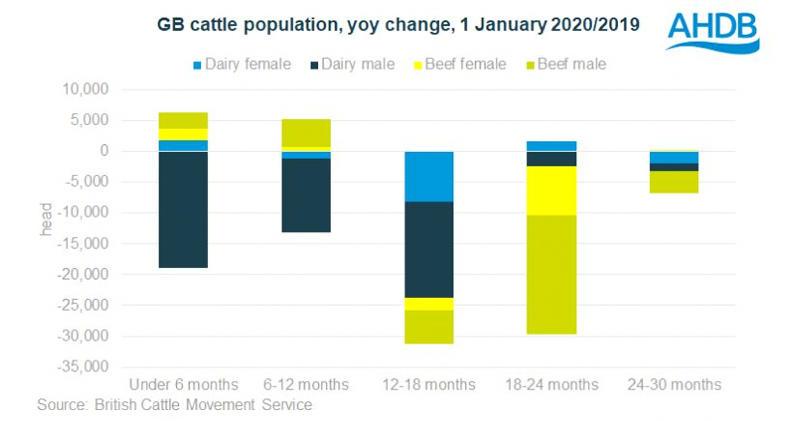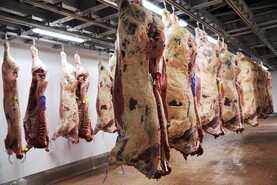There has been no real change in the beef trade in recent days. Factories remain keen to handle any increase in numbers coming on stream, but in most cases are not willing to increase prices paid.
Steers are trading in the main on a base of €3.65/kg, with isolated reports of 3c/kg to 5c/kg higher being paid.
The highest percentage of heifers are now trading at a base of €3.70/kg, but there are still significant numbers moving on a base of €3.65/kg.
At the other end of the market, sellers with the strongest negotiating power are in cases securing an additional 3c/kg to 5c/kg premium.
Throughput
While on the subject of throughput, there was a lot of discussion since Wednesday about the previous week’s kill being recorded at 39,044 head, with many of the opinion that throughput had increased sharply.
It should be noted that the driver behind the increase in throughput was a jump in the number of calves processed.
Throughput increased from just 60 head in the week ending 8 February to 2,421 head in the week ending 14 February.
Leaving calves aside, the kill for the week ending 14 February actually fell by 266 head, with cow supplies marginally tighter.
Cow prices
The number of cows in the market remains tight and this is helping to keep a strong floor under the trade.
Prices have been slowly creeping up in recent weeks. P+3 grading cows are averaging in the region of €2.95/kg to €3.00/kg, with O3 grading cows trading in general from €3.00/kg to €3.10/kg.
Producers or agents handing large numbers are securing an extra 5c/kg to 10c/kg.
R grading cows have moved up 5c/kg to 10c/kg over the last 10 days, leaving prices ranging from €3.20/kg to €3.30/kg. Again, regular sellers have secured an extra 5c/kg for heavy carcase and young cows in plants most active in the cow trade.
U grading cows are trading anywhere from €3.30/kg to €3.50/kg with the majority falling within a price range of €3.35/kg to €3.45/kg.
Specialist producers are having more success in pushing returns for U grading bulls to €3.70/kg, while sellers handling small numbers or possessing lower negotiating power are 5c/kg back.
R grades range from €3.55/kg to €3.60/kg, with flat-priced deals also reported at €3.65/kg for mixed loads of R and U grading bulls. Meanwhile, O grades range from €3.30/kg to €3.45/kg on average.
British cattle herd shrinks
The number of prime beef cattle aged 12 to 30 months in the British cattle herd on 1 January 2020 was 57,300 head or 3.1% lower than the corresponding date in 2019.

British cattle numbers as of 1 January 2020 and change on the corresponding date in 2019.
The report, released by the AHDB, says that this will leave numbers of dairy males and beef heifers of both sexes tighter in the medium term.
There is also contraction in the number of cattle aged under 21 months, with 21,000 head or 1.1% fewer animals on farms.
The extent to which tighter supplies affect beef production will also be influenced by carcase weights and whether contraction in the dairy and suckler herds continues.
Red meat analyst Duncan Wyatt says that if the two herds continue to decline, then this will provide a short-term reprieve with lower numbers of replacement heifers retained.
The market update states that as of 1 January there were 1.491m dairy cows, 3.1% lower (47,800 head) year on year, and 1.437m beef cows, 1.8% lower (26,300 head).
Meanwhile, the influence of heavier carcase weights was seen in January 2020. The number of cattle processed fell marginally by 500 head to 170,200 head.
Prime carcase weights increased 1.1% on average to reach 348.1kg, which in turn underpinned a 0.7% increase in production to reach 78,800t.
There has been no real change in the beef trade in recent days. Factories remain keen to handle any increase in numbers coming on stream, but in most cases are not willing to increase prices paid.
Steers are trading in the main on a base of €3.65/kg, with isolated reports of 3c/kg to 5c/kg higher being paid.
The highest percentage of heifers are now trading at a base of €3.70/kg, but there are still significant numbers moving on a base of €3.65/kg.
At the other end of the market, sellers with the strongest negotiating power are in cases securing an additional 3c/kg to 5c/kg premium.
Throughput
While on the subject of throughput, there was a lot of discussion since Wednesday about the previous week’s kill being recorded at 39,044 head, with many of the opinion that throughput had increased sharply.
It should be noted that the driver behind the increase in throughput was a jump in the number of calves processed.
Throughput increased from just 60 head in the week ending 8 February to 2,421 head in the week ending 14 February.
Leaving calves aside, the kill for the week ending 14 February actually fell by 266 head, with cow supplies marginally tighter.
Cow prices
The number of cows in the market remains tight and this is helping to keep a strong floor under the trade.
Prices have been slowly creeping up in recent weeks. P+3 grading cows are averaging in the region of €2.95/kg to €3.00/kg, with O3 grading cows trading in general from €3.00/kg to €3.10/kg.
Producers or agents handing large numbers are securing an extra 5c/kg to 10c/kg.
R grading cows have moved up 5c/kg to 10c/kg over the last 10 days, leaving prices ranging from €3.20/kg to €3.30/kg. Again, regular sellers have secured an extra 5c/kg for heavy carcase and young cows in plants most active in the cow trade.
U grading cows are trading anywhere from €3.30/kg to €3.50/kg with the majority falling within a price range of €3.35/kg to €3.45/kg.
Specialist producers are having more success in pushing returns for U grading bulls to €3.70/kg, while sellers handling small numbers or possessing lower negotiating power are 5c/kg back.
R grades range from €3.55/kg to €3.60/kg, with flat-priced deals also reported at €3.65/kg for mixed loads of R and U grading bulls. Meanwhile, O grades range from €3.30/kg to €3.45/kg on average.
British cattle herd shrinks
The number of prime beef cattle aged 12 to 30 months in the British cattle herd on 1 January 2020 was 57,300 head or 3.1% lower than the corresponding date in 2019.

British cattle numbers as of 1 January 2020 and change on the corresponding date in 2019.
The report, released by the AHDB, says that this will leave numbers of dairy males and beef heifers of both sexes tighter in the medium term.
There is also contraction in the number of cattle aged under 21 months, with 21,000 head or 1.1% fewer animals on farms.
The extent to which tighter supplies affect beef production will also be influenced by carcase weights and whether contraction in the dairy and suckler herds continues.
Red meat analyst Duncan Wyatt says that if the two herds continue to decline, then this will provide a short-term reprieve with lower numbers of replacement heifers retained.
The market update states that as of 1 January there were 1.491m dairy cows, 3.1% lower (47,800 head) year on year, and 1.437m beef cows, 1.8% lower (26,300 head).
Meanwhile, the influence of heavier carcase weights was seen in January 2020. The number of cattle processed fell marginally by 500 head to 170,200 head.
Prime carcase weights increased 1.1% on average to reach 348.1kg, which in turn underpinned a 0.7% increase in production to reach 78,800t.







 This is a subscriber-only article
This is a subscriber-only article










SHARING OPTIONS: